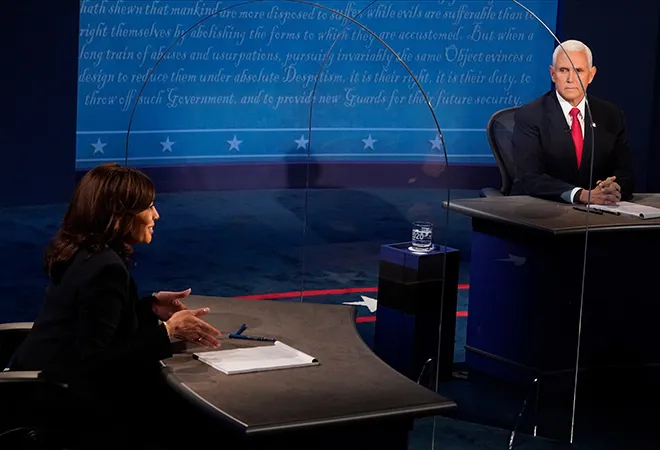With less than a month to go until Election Day, in a vitiated yet keenly-watched US Presidential campaign, the seemingly lacklustre vice presidential debate between Republican incumbent Vice President Mike Pence, and his Democratic opponent Kamala Harris, was both a surprise and a relief.
A surprise because of its marked divergence from the previous, schoolyard brawl of a debate between President Donald Trump, who constantly interrupted and heckled his Democrat opponent Joe Biden just two weeks earlier; and a relief because it held the hope of a possible return to civility in America’s coarse political discourse in the not so distant future.
But beneath the blandness, the complexities and fault-lines of American politics were on display for all to see.
What Mike Pence’s ‘Mansplaining’ Is Symptomatic Of
Kamala Harris is only the 4th woman nominee on a Presidential ticket in American history, and the first Black woman in that role. Her rise as a public servant from public prosecutor to California’s Attorney General to US Senator, to now Vice Presidential nominee, has been meteoric.
If Mike Pence had any inkling of the poor optics of a White man interrupting and ‘correcting’ America’s first Black woman vice presidential nominee, perhaps he would have stopped the ‘mansplaining’.
But not only did he continue to, as Harris smiled on and told him to let her finish speaking without interruption, he went on to ignore the White, female moderator, Susan Page too as she asked him to stick to the questions asked, not interrupt his opponent and not exceed his allotted time. Polls indicate that a majority of US women voters have turned against the Trump presidency, but Pence’s ‘mansplaining’ with his opponent, and his dismissiveness towards the moderator, is symptomatic of the inexplicable discomfort many Americans still have with women in political leadership – a glass ceiling that Hillary Clinton tried but failed to break through in 2016.
Harris Didn’t Push Hard Enough On Trump Admin’s COVID Strategy: An Effort To Not ‘Rock the Boat’?
From Kamala Harris’s own demeanor during the debate, it is clear to any lay observer that she is keenly aware of this very discomfort that places a greater burden on women’s shoulders to prove that their emotional intelligence is as high as their political intellect and acumen. Her sternest, strongest reply to Mike Pence came when he deflected on the issue of excessive force against unarmed young Black men and women shot or killed by law enforcement, and tried to shift the conversation to the violent protests that ensued demanding justice.
Observers say Harris didn’t push on the coronavirus response hard enough, possibly in order not to ‘rock the boat’ of a comfortable 10 point lead that Joe Biden is showing in the polls with less than four weeks to go.
US election observers say that in the past, an aggressive debater has weakened the main candidate.
But the subtext is clear: by not railing against Trump, by displaying restraint while answering questions, or smiling and gently reprimanding Pence as he interrupted her, Harris came across as a woman in control.
And so, if Pence – when asked on abortion rights and the possible overturning of Roe v Wade with a new Supreme Court appointment – chose to answer with remarks on Iran and the assassination of Qassem Soleimani (ordered by the Trump administration), his deflections were matched by Harris’s seeming reluctance to push back on propaganda, especially against a Vice President who heads the national coronavirus response task force, more so at a time when President Trump himself is another active COVID case statistic.
How Much Of a Mark Will the Vice Presidential Debate Make With Voters?
If anything, the coronavirus pandemic has underscored the same fault-lines the debate exposed. Out of the 210,000 plus Americans who have died due to COVID-19, a majority of them are Black and Hiic, with low incomes. For them, and indeed for many Americans irrespective of race, healthcare, immigration and taxes are potent campaign issues that often sway American voters.
But in an election season dominated by a pandemic, an economic crisis, racial violence and rising right wing extremism fuelled by White supremacists – who are now being labeled ‘domestic terrorists’ by the FBI – it is unclear how much of a mark the vice presidential debate will make with voters.
There is much that is both unusual and alarming in America as the polls approach – from the unprecedented protests and violence across the streets of major cities, to a President recovering from COVID-19 refusing to take precautions advised by the country’s topmost doctors, and now refusing to engage with his Democrat opponent, Joe Biden, in a virtual debate instead of a live one, while he is still contagious.
Without a doubt this election campaign has polarised America unlike any other in recent history.
Biden-Harris: A Ten Point Lead Is More Than A Fighting Chance
As it draws to a close, the failures of the Trump administration in handling the pandemic and its social, cultural and economic aftermath, and in preserving a spirit of global cooperation that will be key to recovery, the Democrats and their message of reform, healthcare and inclusiveness seem to be leading the polls.
A ten point lead is more than a fighting chance, and Kamala Harris’s tactical restraint – just as Joe Biden’s (not always successful) determination not to be provoked by Donald Trump when they faced off against each other – is a holding pattern of sorts. One that could well be the only real strategy for Democrats to win come 3 November.
This commentary originally appeared in The Quint.
The views expressed above belong to the author(s). ORF research and analyses now available on Telegram! Click here to access our curated content — blogs, longforms and interviews.




 PREV
PREV


